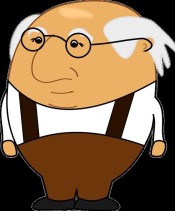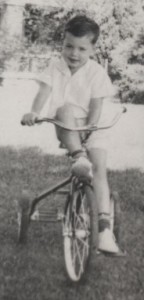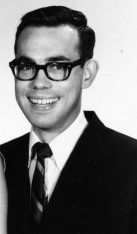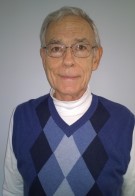 時間過的真快!很難相信我比去年這時候老了一歲。
時間過的真快!很難相信我比去年這時候老了一歲。
我記得我二十三歲的時候。結了婚不到一年就搬了家——太太和我(兩個人)從美國搬到亞洲,開始學習漢語。慢慢認識一些中國人,慢慢地跟他們成為朋友。那時候,長輩叫我小弟,晚輩叫我大哥——謝大哥。兩年以後我們生了第一個孩子,樂真。一旦作了父親,晚輩就開始叫我謝叔叔。兩三年以後,太太給我生老二,義方。晚輩還是叫我叔叔。
不知道我換了幾個月曆,但是有一天我梳頭時,發現鏡子里的那人——不知道他是誰——頭髮已經開始變白。差不多也就是那時候我注意到晚輩叫我謝伯伯。心理很想問問太太“謝伯伯是誰?”,但是我不敢開這個玩笑;我知道謝伯伯是誰。我只好承認,我只好面對事實——鏡子里的那人也是我;白髮是我的。
 也許您可猜想,我的故事還沒講完。樂真、義方長大,成人。樂真在東歐,阿爾巴尼亞結了婚;兩三年以後太太和我抱了外孫女。義方也結了婚;兩三年以後也給我們孫女。有了孫女,我在社會的階級自然而然的改了變——我升了級!華人朋友開始叫我爺爺了。問題是我還不覺得我是個爺爺。別人是爺爺——沒錯!是應該的——他們的年紀到了標準。但是,我這個人——自己不覺得老,所以華人朋友,特別是晚輩們開始稱我為“謝爺爺”,我聽得很不習慣。不習慣不說,我也不想承認我是“爺爺”。
也許您可猜想,我的故事還沒講完。樂真、義方長大,成人。樂真在東歐,阿爾巴尼亞結了婚;兩三年以後太太和我抱了外孫女。義方也結了婚;兩三年以後也給我們孫女。有了孫女,我在社會的階級自然而然的改了變——我升了級!華人朋友開始叫我爺爺了。問題是我還不覺得我是個爺爺。別人是爺爺——沒錯!是應該的——他們的年紀到了標準。但是,我這個人——自己不覺得老,所以華人朋友,特別是晚輩們開始稱我為“謝爺爺”,我聽得很不習慣。不習慣不說,我也不想承認我是“爺爺”。
也許您聽我講這些,覺得很為奇怪。但是,您要記得,我是個美國人。美國人的概念和華人的概念不一樣;美國人不承認自己老了。美國老先生聽到“老先生”一詞,我們會不高興的。也許我們會問:“誰是老先生?不是我。”美國人懷念我們的青春,不期待聽到“老”這個詞。所以,晚輩叫我“謝爺爺”,我聽得真不習慣。
 從小弟升為大哥;從大哥變成叔叔。叔叔變為伯伯。從伯伯升到高峰爺爺的稱呼。而且因為有太多的證明,所以不能否認我慢慢地變為老人!實事求是。鏡子證明;孫子和外孫證明;月曆證明;早上晚間所吃的藥丸也證明。我必須接受。
從小弟升為大哥;從大哥變成叔叔。叔叔變為伯伯。從伯伯升到高峰爺爺的稱呼。而且因為有太多的證明,所以不能否認我慢慢地變為老人!實事求是。鏡子證明;孫子和外孫證明;月曆證明;早上晚間所吃的藥丸也證明。我必須接受。
也許您想知道我為什麼跟您談這些。是因為我發現我們都要珍惜時間,愛惜光陰。時間不等着我們。聖經記載着很多智慧話。《聖經》告訴我們說:“你趁著年幼…當記念造你的主”(傳道書12:1)。《聖經》里的一位國王勸我們要依靠神一輩子;他說:“我從前年幼,現在年老,卻未見過義人被棄,也未見過他的後裔討飯”(詩篇37:25)。《聖經箴言》也勸我們多聽從神的誡命:“因為他必將長久的日子、生命的年數與平安給你”(3:4)。他又形容神的智慧說:“她右手有長壽,左手有富貴。她的道是安樂,她的路全是平安”(3:16-17)。
 您想要獲得平安嗎?請敬畏創造您的神。您想要長壽嗎?請遵守神的誡命。
您想要獲得平安嗎?請敬畏創造您的神。您想要長壽嗎?請遵守神的誡命。
我希望您和我都要下決心——從新敬畏神,聽從神,順服神——使得我們坦然無懼的承認鏡子里的那位是誰!
祝福您新年快樂!
The Old Man in the Mirror
Time flies, doesn’t it? Hard to believe that it’s December. Hard to believe that Christmas will soon be here. Hard to believe that one year will change into another. Hard to believe that I’m a year older!
I remember when I was 23 years old. After less than a year of marriage, I took my wife and moved from the USA to Asia—just the two of us—where we began to study the Chinese language. We met several Chinese, and little-by-little became friends with them.
In these early days, people older than I called me “xiao di” (little brother), and those younger than I referred to me as “da ge” (older brother)—Older Brother Xie (Xie being the Chinese surname I was given). A couple of years later, Sharon gave birth to our first child—Alethea. After I became a father, friends who were younger than I began to call me “shu shu” (uncle-younger-than-my-father). Three years later my wife gave me our second child—Lewis. I was still referred to as shu shu by our younger friends.
I don’t know how many calendars I had changed, but one day as I was combing my hair, I looked at the man in the mirror (I don’t know who he was!), and noticed that his hair was getting white. It was just about that time that I noticed that Chinese friends younger than I were calling me “bo bo” (uncle-older-than-my-father)—“Xie Bobo”. I wanted to ask Sharon, “Who is Xie Bobo?” but I didn’t dare crack such a joke; I knew who Xie Bobo was! I might as well go ahead and admit it, might as well go ahead and face the reality that the man in the mirror was me and the white hair was mine.
You can probably guess that my little story is not over yet. Alethea and Lewis both grew up and turned into adults. Alethea married in Albania, and two or three years later, Sharon and I held an “outside granddaughter” (child born to one’s daughter). Lewis married also, and within two or three years we had a “granddaughter” (child born to one’s son).
Upon becoming a grandfather, my status in society changed—I graduated into a new level! I became a “ye ye” (grandfather). The problem was that I didn’t consider myself a grandfather. Yes, other people should be called ye ye; they were ready for it and they met the qualifications. But not me. I didn’t consider myself old! So, when my Chinese friends called me Xie Ye Ye, I couldn’t get used to it. Not only was I not used to it, I didn’t want to admit that I was a ye ye.
Perhaps all this sounds very strange to you. But you should remember that I’m an American. The way Americans look at things is different from the way Chinese look at them; Americans don’t admit to being old. When an elderly American man hears someone say, “Hey, old man,” he may get angry. Perhaps he’ll even ask the person, “Who is old? Not I!” Americans fondly remember their youth and they don’t look forward to getting old. So when I hear someone say, “Xie Ye ye,” I’m not at all used to it.
From “xiao di” to “da ge;” from “da ge” to “shu shu.” From “shu shu” to “bo bo.” From “bo bo” to the highest level of nomenclature—ye ye. And since there are so many proofs, the facts became undeniable—I’m getting old. “Seek truth from facts,” the Chinese say, and the facts are plain. The mirror proves it; grandchildren prove it; the calendar proves it; my daily medications—morning and night—prove it, so I might as well accept it—I’m getting old!
I bet you’d like to know why I’m telling you all this. It’s because I now realize how precious time is. We should make the best use of time that we can, as the clock will not wait for anyone. The Bible records a lot of wisdom, and the Bible tells us to “Remember your creator in the days of your youth…” (Ecclesiastes 12:1, NRSV). A certain king in the Bible exhorts us to rely on God throughout our lives; he said, “I have been young, and now am old, yet I have not seen the righteous forsaken or their children begging bread” (Psalms 37:25). The book of Proverbs encourages us to obey God’s commandments, because “length of days and years of life and abundant welfare they will give you” (3:2). He continues to describe the wisdom of God when he says, “Long life is in her right hand; in her left hand are riches and honor. Her ways are ways of pleasantness, and all her paths are peace” (3:16-17).
Do you want to find peace? Reverence the God who made you. Do you want to live a long time? Obey God’s commandments.
I hope you and I both will determine to renew our commitment to God, to listen to him and to obey him. Then we can look courageously at the person in the mirror and admit who he is!
Merry Christmas and Happy New Year!
【聖誕節】:鏡子里的那位老先生是誰?
The Old Man in the Mirror
作者:謝德華 By ©Edward Short
